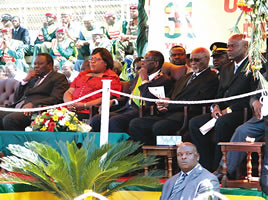
Dignitaries on the diaz at the 31st anniversary of Zimbabwe independence ceremony. On the podium is President Robert Mugabe, Vice-President Joice Mujuru and others., a photo by Pan-African News Wire File Photos on Flickr.
Draft Constitution to be presented to Parly next week
Wednesday, 30 January 2013 00:00
Farirai Machivenyika Senior Reporter
Zimbabwe Herald
THE draft Constitution to be presented to Parliament next week recognises 16 languages as the official means of communication in Zimbabwe, among other new provisions. The Lancaster House
Constitution — set to be repealed by the new charter — used to recognise only English, Shona and Ndebele as the official languages. But now Chewa, Barwe, English, Kalanga, Khoisan, Nambya, Ndau, Ndebele, Shangani, Shona, Sign Language, Sotho, Tonga, Tswana, Venda and Xhosa would be official languages in the country.
“An Act of Parliament may prescribe other languages as officially recognised languages and may prescribe languages of record,” reads the draft constitution.
“The State and all institutions and agencies of Government at every level must:
(a) ensure that all officially recognised languages are treated equitably; and
(b) take into account the language preferences of people affected by governmental measures or communications.”
The draft urges the State to promote and advance the use of all languages used in the country, including sign language, and to create conditions for the development of those languages.
The draft constitution also recognises the role played by war veterans in fighting against colonialism.
“We the people of Zimbabwe, (are) united in our diversity by our common desire for freedom, justice and equality, and our heroic resistance to colonialism, racism and all forms of domination and oppression,” reads the draft.
It exalts and extols “the brave men and women who sacrificed their lives during the Chimurenga/Umvukela and national liberation struggles.”
The draft also acknowledges “the supremacy of Almighty God, in whose hands our future lies”.
There are a number of new provisions in the draft beginning with a detailed preamble capturing the country’s history, including the fight against colonialism and inequality and future aspirations.
The draft Constitution comprises 18 chapters that include those on the founding provisions, national objectives, citizenship, declaration of rights, the Executive, the Legislature, elections, the Judiciary and principles of administration.
The others are on the civil service, the security services, independent commissions, supporting democracy, provincial and local government, traditional leaders, agricultural land, finance and general and supplementary provisions.
The preamble celebrates sons and daughters of Zimbabwe who fought against racial discrimination and continue to work for the progress of the country.
It values the country’s rich natural resources and natural resources, diversity, exalts God and commits every Zimbabwean to respect the constitution as the supreme law of the country.
The chapters on the founding provisions and national objectives lay out the foundation the country is built on that include equality of all, respect for democracy and human rights, gender equality and good governance and holds the State responsible to create an enabling environment for development.
The draft also expands on citizen’s rights through a broader chapter on the Declaration of Rights.
The rights provided for are the right to life, labour rights, right to education, water, shelter, environmental rights, freedom of expression and the media, right to marriage and prohibition of same-sex marriages.
Others include property rights and right to agricultural land, rights for women, children and the elderly.
The rights will, however, be limited especially in respect to the right of other people and during situations of public emergency.
The draft also introduces presidential running mates under the chapter dealing with the Executive.
The presidential candidate will nominate two people to contest an election and in the event of assuming office the two will become first and second vice-president.
In the event that the President dies, resigns or is removed from office, the first vice-president will assume office for the remainder of the former President’s term.
The provision would come into effect only after 10 years.
The House of Assembly will be renamed to become the National Assembly and will comprise 210 members.
However, for the first two parliaments from the effective date of adoption of the new constitution, an additional 60 female members, six from each province will be elected on a proportional representation basis based on the number of votes for each political party’s candidates in the provinces.
The Senate will comprise 80 members, six elected from each province by a system of proportional representation.
The others will include 16 chiefs, two from each province, but excluding metropolitan provinces and elected by the provincial assembly of chiefs.
The others will be the president of the chiefs’ council and his deputy and two others representing people with disabilities.
No comments:
Post a Comment